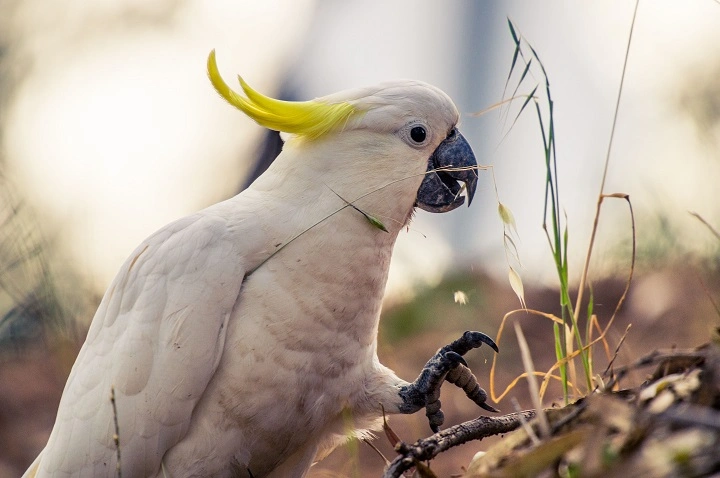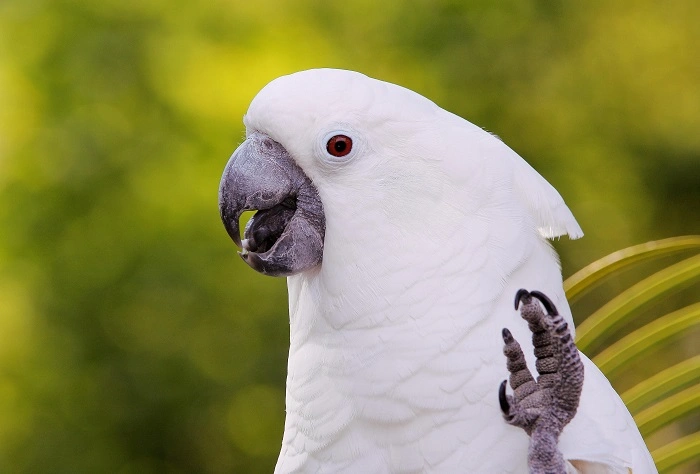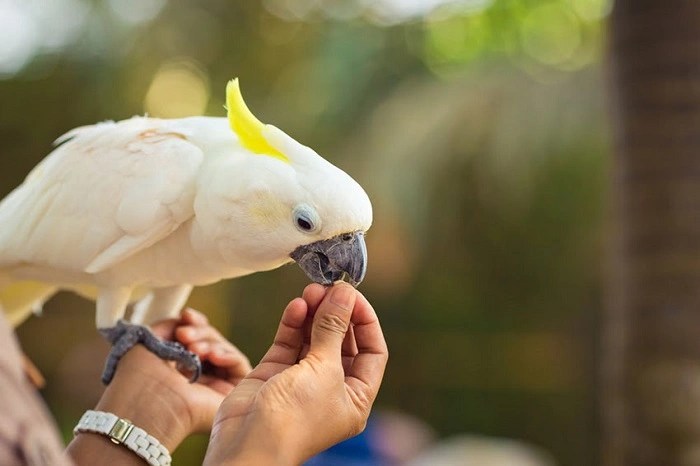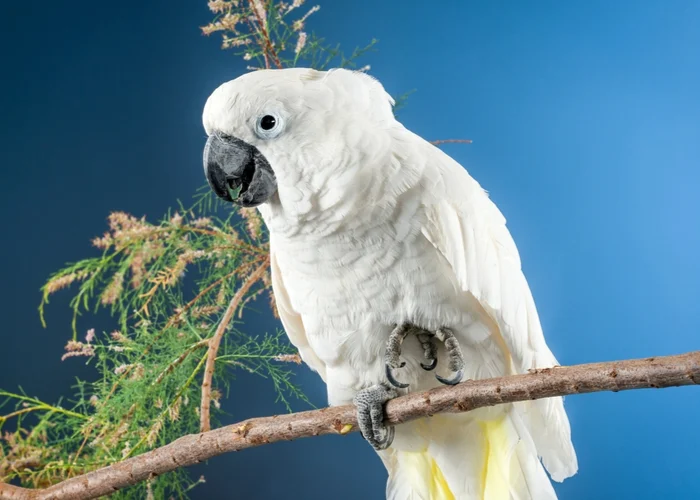For bird enthusiasts looking for a feathered friend with a bigger personality and presence, large pet birds offer both beauty and companionship. These magnificent creatures are not only visually stunning but also bring unique traits to the table, from their intelligence to their social behaviors. Whether you’re considering adopting a large pet bird for the first time or you’re a seasoned bird owner, large pet birds can make incredible companions. In this blog post, we’ll take a closer look at some of the most popular large pet bird species, their care requirements, and what makes them such wonderful pets.
Why Choose a Large Pet Bird?
The Appeal of Large Pet Birds
Large pet birds, such as parrots and macaws, are admired for their vibrant plumage, captivating personalities, and exceptional intelligence. These birds are known for their strong bonds with their owners, their ability to mimic human speech, and their ability to form deep connections with their families. With proper care and attention, large pet birds can live for decades, making them long-term companions.
Large pet birds are often sought after for their:
- Social Nature: Many large pet birds are highly social and enjoy interacting with their owners, forming strong, affectionate bonds. These birds thrive on attention and companionship, making them ideal for individuals or families who are ready to provide them with the time and care they need.
- Impressive Intelligence: Large pet birds, particularly parrots, are known for their high intelligence. They can learn tricks, solve puzzles, and even mimic human speech, making them engaging and interactive pets.
- Beautiful Appearance: With their stunning feathers and vibrant colors, large pet birds are visually striking, often becoming the centerpiece of the room. Their beauty is hard to ignore, and their presence adds character to any home.
The Responsibilities of Owning a Large Pet Bird
Owning a large pet bird comes with its own set of responsibilities. These birds require time, space, and a dedicated commitment to their care. Unlike small pet birds, large birds have specific needs when it comes to diet, social interaction, and mental stimulation.
Before adopting a large pet bird, potential owners should consider:
- Space: Large pet birds need ample space to move around and exercise. A large cage, as well as time outside the cage for flying and playing, is essential to keeping them healthy and happy.
- Time and Attention: These birds are highly social and require regular interaction with their owners. They can become bored or anxious if left alone for long periods.
- Diet: Large pet birds have specialized dietary needs that should be met with a balanced, nutritious diet. This includes fresh fruits, vegetables, seeds, and specially formulated pellets.
- Long Lifespan: Many large pet birds, such as macaws and cockatoos, can live for several decades, sometimes up to 50 years or more. Owning one of these birds is a long-term commitment.
Popular Large Pet Birds
Macaws
Macaws are among the largest and most colorful pet birds in the world, known for their stunning feathers and playful personalities. With their long tails and vibrant plumage, macaws are a true sight to behold. There are several species of macaws, including the Blue-and-Gold Macaw, Scarlet Macaw, and Hyacinth Macaw, each with unique colors and characteristics.
- Size: Macaws can range from 30 to 40 inches in length, depending on the species.
- Lifespan: They can live for 40-60 years or more.
- Personality: Macaws are highly social and affectionate birds that enjoy attention and interaction. They are also known for their intelligence and ability to learn complex tasks and mimic speech.
- Care: Macaws require large cages and plenty of time outside of their cages to fly and play. They thrive in environments where they can socialize and engage in mental stimulation.
Cockatoos
Cockatoos are known for their distinctive crests and charming personalities. These large birds come in various species, including the Moluccan Cockatoo, Umbrella Cockatoo, and the lesser-known but equally delightful Goffin’s Cockatoo. With their loud calls and affectionate nature, cockatoos are one of the most beloved types of large pet birds.
- Size: Cockatoos typically range from 18 to 24 inches in length.
- Lifespan: Cockatoos can live between 40 to 60 years, depending on the species.
- Personality: These birds are highly affectionate and thrive on attention. They are known to be emotional and sensitive, often bonding strongly with their owners.
- Care: Cockatoos require socialization and mental stimulation to stay happy and healthy. They can be quite vocal and may need to be managed in a household with appropriate space and structure.
African Grey Parrots
African Grey Parrots are known for their remarkable intelligence and ability to mimic human speech. These birds are considered one of the most intelligent bird species in the world, capable of learning hundreds of words and even understanding context. Their grey feathers and striking red tails make them easy to identify.
- Size: African Grey Parrots typically measure 12 to 14 inches in length.
- Lifespan: They can live for 50 to 60 years in captivity.
- Personality: These birds are known for their calm demeanor, intelligence, and strong bonds with their owners. They can be sensitive and require consistent interaction to thrive.
- Care: African Greys require mental stimulation and enrichment to prevent boredom and behavioral issues. They also need a balanced diet and a spacious environment.
Amazon Parrots
Amazon Parrots are another popular species of large pet birds, known for their colorful plumage and outgoing personalities. There are several different species of Amazon parrots, including the Yellow-Naped Amazon and the Blue-Fronted Amazon, each with its unique characteristics.
- Size: Amazon parrots range in size from 12 to 15 inches.
- Lifespan: They can live from 40 to 60 years.
- Personality: Amazon parrots are playful, social, and vocal birds that enjoy being the center of attention. They are known for their ability to mimic sounds and words and are often described as “clowns” due to their fun and engaging personalities.
- Care: These parrots need a lot of interaction and stimulation to stay happy. Regular playtime outside of the cage, along with a variety of toys and activities, will help keep them mentally engaged.
Conures
Conures are a smaller species of large pet birds, but they still pack a lot of personality into their vibrant frames. These birds come in various colors, including green, yellow, and orange, and are known for their playful, affectionate nature.
- Size: Conures typically measure around 10 to 20 inches in length.
- Lifespan: Conures can live for 20-30 years, depending on the species.
- Personality: Conures are very social and love to interact with their owners. They are highly vocal and playful, often engaging in amusing antics that make them great companions for active households.
- Care: Conures are highly energetic and require regular exercise and mental stimulation. They enjoy a variety of toys, activities, and interaction to stay happy.
How to Care for Large Pet Birds
Space and Housing
Large pet birds need ample space to move around comfortably. A large cage with bars spaced appropriately for the bird’s size is essential. The cage should be big enough for the bird to stretch its wings and move around without feeling cramped. Additionally, these birds need plenty of out-of-cage time for flying, climbing, and playing in a safe environment.
Diet and Nutrition
A healthy diet is crucial for the well-being of large pet birds. While the specific dietary needs will vary depending on the species, most large pet birds require a balanced diet consisting of:
- Fresh fruits and vegetables (such as apples, carrots, and leafy greens)
- High-quality pellets or seeds
- Fresh water daily
- Occasional nuts and seeds as treats
Avoid feeding your bird foods that are toxic to them, such as chocolate, avocado, caffeine, and alcohol.
Socialization and Enrichment
Large pet birds are social animals that need regular interaction with their owners. Providing them with daily bonding time, play sessions, and mental stimulation through toys and puzzles will keep them happy and healthy. Birds that lack interaction can develop behavioral problems such as feather plucking or aggression.
Regular Veterinary Care
Like any pet, large pet birds require regular veterinary check-ups to monitor their health. Be sure to find a vet who specializes in avian care and is knowledgeable about the unique needs of your bird.
FAQs About Large Pet Birds
Which large pet bird is the best for beginners?
Conures or smaller Amazon parrots are often considered a good choice for beginners due to their friendly nature and manageable size.
How much space do large pet birds need?
Large pet birds need large cages and plenty of time outside the cage for flying and exercise. Their living space should be spacious enough to accommodate their size and allow them to move freely.
Can large pet birds live alone?
Large pet birds can live alone, but they require plenty of attention, socialization, and stimulation to stay happy. These birds thrive on interaction and may become lonely or bored if left alone for too long.
How long do large pet birds live?
The lifespan of large pet birds varies by species. For example, macaws can live 40-60 years, African Grey Parrots live 50-60 years, and cockatoos can live for 60 years or more.
Are large pet birds loud?
Many large pet birds are quite vocal and can make loud calls or noises. If noise is a concern, it’s important to choose a species that is known for being quieter, such as a Senegal parrot or a Pionus parrot.
Large pet birds are wonderful companions for those who have the time and commitment to meet their needs. With their stunning beauty, intelligence, and affectionate personalities, they make fantastic additions to the right home. Whether you choose a colorful macaw, a chatty Amazon parrot, or an intelligent African Grey, owning a large pet bird is a rewarding experience that will bring joy for years to come.





